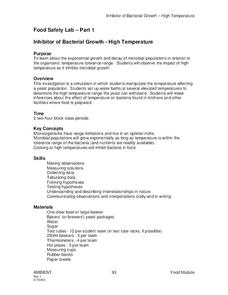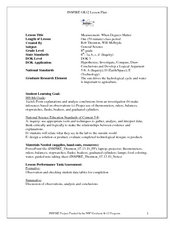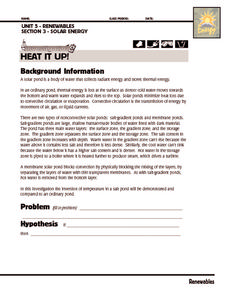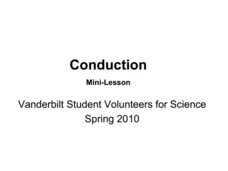Curated OER
Inching Our Way through Measurement
Students review how to use an inch ruler and listen to the story, Inch by Inch by Leo Lionni. In this measuring lesson, students work in small groups to create an Inch Poster. Students then use an inch ruler to measure different objects...
Curated OER
Food Safety Lab
Students determine the optimal living conditions for yeast and apply these results to microbes in food. In this microbiology lab instructional activity, students observe the reaction of yeast to elevated temperatures. They relate these...
Curated OER
The Affect of Water Temperature on Living Organisms
Students examine the environmental impact of global warming. In this environmental science lesson, students design and conduct an experiment about the effect of temperature on paramecia. They write a lab report about their experiment.
Curated OER
Chemistry Lab-Molar Volume of Gas
Students determine the molar volume of hydrogen gas. In this molar volume lesson plan, students find the molar volume of hydrogen produced in a reaction between magnesium and hydrochloric acid. They use a eudiometer to measure the volume...
Curated OER
Chemistry Lab-Heat of Fusion
Students determine the heat of fusion of ice. In this heat of fusion lesson plan, students use a calorimeter to measure the molar heat of fusion of ice. Students determine the heat required to melt one mole of ice using hot water and ice...
Curated OER
Enzyme Lab
Students investigate the enzyme catalase. In this enzyme lesson plan, students observe a normal catalase reaction, they observe liver tissue, potato, chicken and apple for the enzyme catalase and they study the effects of temperature and...
Curated OER
Heat of Formation using Hess's Law Lab
In this heat of formation worksheet, students determine the heat of formation for magnesium by combining 3 given reactions and using Hess's Law. Students then complete a data calculations chart for each reaction.
Curated OER
Measurement: When Degrees Matter
Eighth graders record the temperature change of the beakers. In this general science lesson, 8th graders create their own data table for recording observations. They discuss experimental results and cite real life applications.
Curated OER
Optional Laboratory: Comparing Soil Temperatures In Sun and Shade
Students work together to test the temperatures of different soils in shade and sun. They make their own hypothesis before beginning the experiment. They record their data and discuss as a class.
University of Georgia
Heating and Cooling of Land Forms
Compare heating and cooling rates of different land forms. A lab activity has groups collect data on the rate of heating and cooling of soil, grass, saltwater, fresh water, and sand. An analysis of the rates shows how the different land...
Texas State Energy Conservation Office
Investigation: Insulation
Youngsters compare the heat-holding abilities of three different cans by insulating two with different materials and measuring the temperature change of hot water over a 20-minute period.
Virginia Department of Education
Heat Transfer and Heat Capacity
It's time to increase the heat! Young chemists demonstrate heat transfer and heat capacity in an activity-packed lab, showing the transitions between solid, liquid, and gaseous phases of materials. Individuals plot data as the changes...
Royal Society of Chemistry
Organic Molecules Day—Chemistry Outreach
In search of an organic lab that employs real-life techniques and analysis methods? Groups carry out the nitration of methyl benzoate, then attempt to determine the number and location of the nitro groups added to the benzene ring....
Wild BC
The Greenhouse Effect: Warming the Earth Experiment
First in a two-part lesson on the greenhouse effect, this lesson involves a classroom demonstration of the phenomenon, and a lab group experiment with color and absorption. Although there are easier ways to demonstrate the greenhouse...
Cornell University
Atomic Bonding
Explore the connection of surface area to bonding within atoms. Learners complete lab investigations to model changing surface area with different sizes and concentrations of atoms. A flour fireball demonstration follows the labs to...
Virginia Department of Education
Partial Pressure
At some point, everyone has been under pressure—even Dalton! Explore Dalton's law of partial pressures with young chemists as they measure the volume of air extracted from a sample compared to its original volume. Class members perform...
Curated OER
Module 7 Revision Guide - Chemistry
Two versions of this handout are provided, the second with more detailed information on the same topics. Chemistry aces survey chemical reactions, heat energy transferred, and the action of enzymes by reading this resource. You can...
Texas State Energy Conservation Office
Investigation: Heat it Up!
This demonstration of solar ponds can be used in an earth, environmental, or physical science setting. Lab groups set up a solar pond and model how it is able, due to a salt concentration gradient, to maintain heat for future use.
Curated OER
Heat and Conduction
This simple activity is ideal for upper elementary learners when studying physical science. Using their sense of touch to describe how hot something feels, and then comparing their observations to thermometer measurements, they discover...
Curated OER
Moldy Jell-O
Mini mycologists plan an experiment to determine what affects the growth of mold on gelatin. A list of available materials is provided, but the procedure needs to be designed by the lab group. A data table is also provided in which to...
Curated OER
Reading the River
In collaborative groups, young ecologists measure the temperature, pH, and dissolved oxygen for three different freshwater samples. They examine each sample with a microscope and record observations on the microorganisms in the pond...
Beyond Benign
Exothermic and Endothermic Reactions
How can you tell the difference between endothermic and exothermic reactions? Chemistry scholars perform and observe two chemical reactions, measure the temperature throughout, then draw conclusions about changes in energy from their...
Curated OER
Field Trip to test Water Quality
Students examine water quality indicators,test water quality and record their results. In this water quality lesson students complete a water testing lab and complete a lab report.
Curated OER
Ice Cream Blizzards
Fourth graders explore whether the making of homemade ice cream is a physical change or a chemical change in a lab experiment. Students identify states of matter, describe the physical properties of states, and collect temperature data...

























